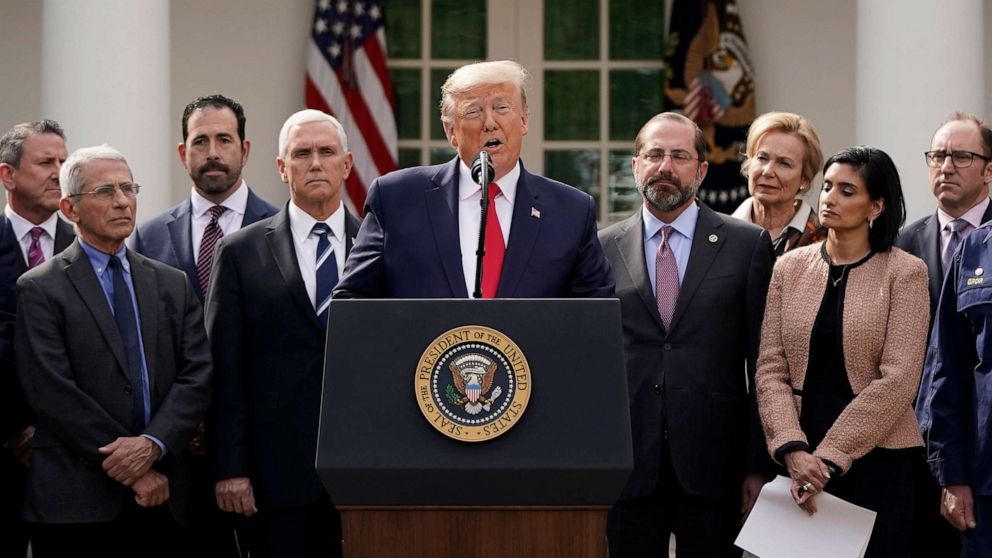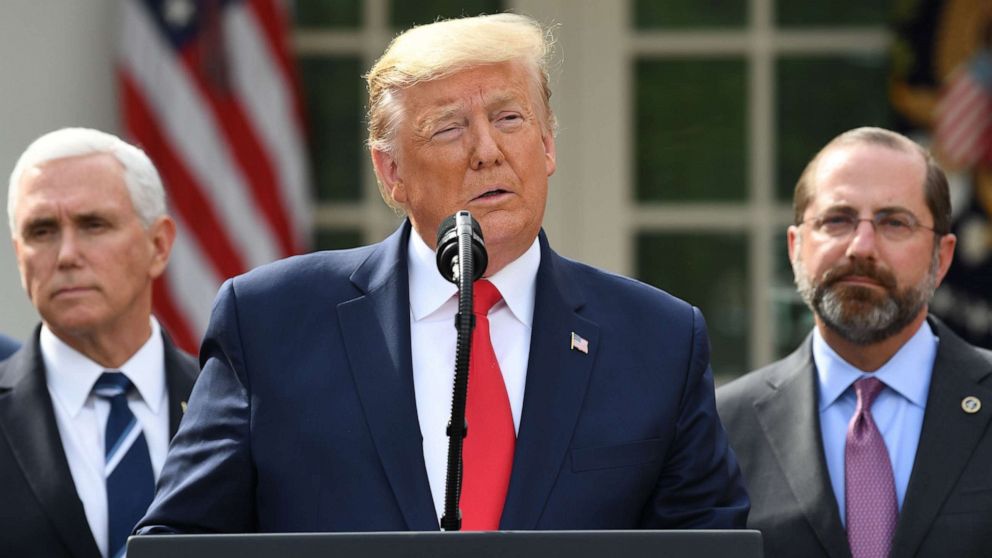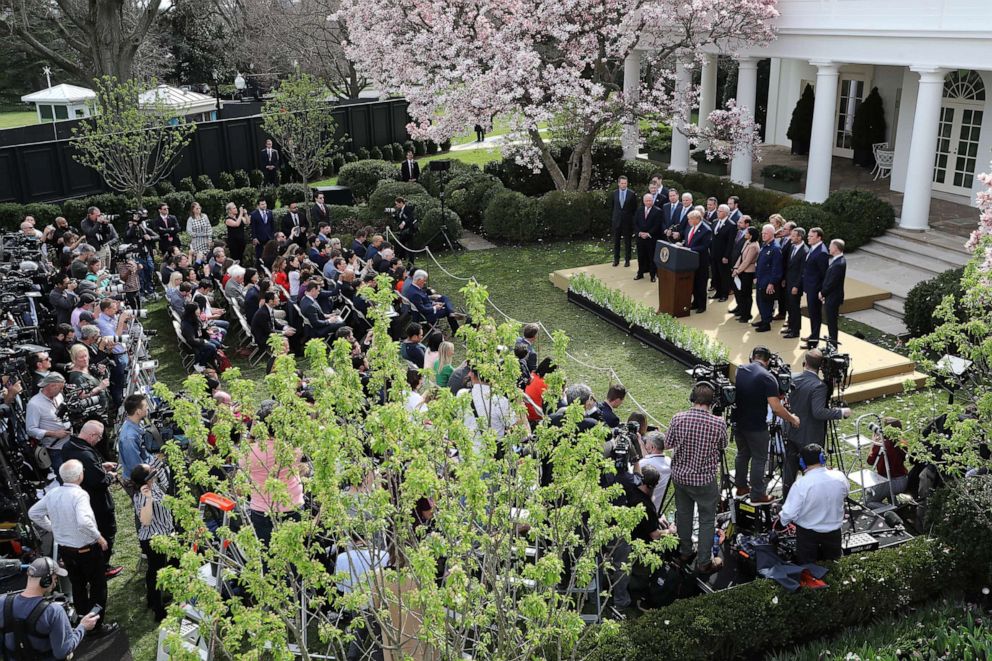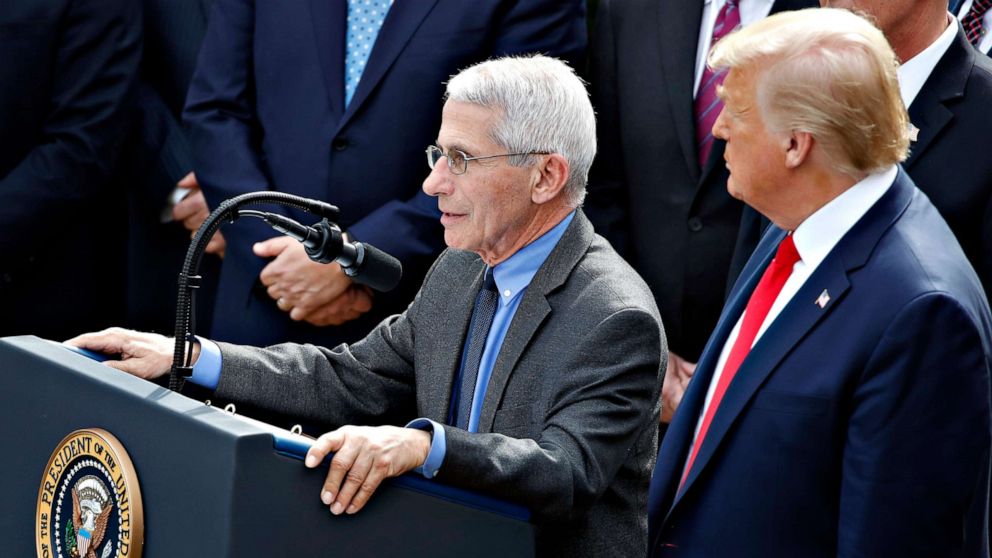
This article is more than
5 year old
President Donald Trump announced Friday he's declaring a national emergency to deal with the coronavirus crisis as cases increase alarmingly and criticism mounts over how he's responding to the situation.
He also said he "most likely" will get tested himself, although he said he had no symptoms. "I think I will be," he said. "Fairly soon, we're working on that, we're working out a schedule," he responded to a reporter's question, saying not because of any exposure he might have had, "but because I think I will do it anyway."
He had been photographed last weekend standing next to a Brazilian official who tested positive.
Speaking from the Rose Garden, Trump said, "To unleash the full power of the federal government, I am officially declaring a national emergency." Referring to that phrase as "two very big words," he said it would allow him to quickly get $50 billion to states, territories and localities "in our shared fight against this disease."
Pres. Donald Trump: "To unleash the full power of the federal government... I am officially declaring a national emergency." https://t.co/CMrrTzYHIC pic.twitter.com/01GpAN3MFD
— ABC News (@ABC) March 13, 2020
With Dr. Anthony Fauci, Vice President Mike Pence, Health and Human Services Secretary Alex Azar and other members of his coronavirus task force standing behind him, Trump said, "No resource will be spared -- nothing whatsoever."

The news conference was also an effort to deal with the political fallout two days after a speech to the nation Wednesday night that was seen as largely ineffective, leaving many confused and Wall street rattled.
"Declaring a national emergency does two things: it coveys to the public that the nation faces a serious crisis and that drastic action is necessary and it will immediately make available resources and other support that can be directed to protect communities across the nation," former Acting Homeland Security Undersecretary John Cohen, now an ABC News contributor, said.
MORE: Two-thirds of Americans concerned about contracting coronavirus, as country grapples with growing crisis: POLL"This is an important step that based on current conditions should surprise no one -- the only surprise is that it wasn't done sooner," Cohen said.

"I'm also asking every hospital in this country to activate its emergency preparedness plan, so that they can meet the needs of Americans everywhere," Trump said in his remarks.
"Emergency orders I'm issuing today will also confer broad new authority to the Secretary of Health and Human Services. The Secretary of HHS will be able to immediately wave revisions of applicable laws and regulations to give doctors, hospital -- all hospitals -- and health care providers maximum flexibility to respond to the virus and care for patients," the president continued.
MORE: How hospitals can handle an influx of patients with COVID-19"This includes the following critical authorities: the ability to waive laws to enable tele-health, a fairly new, and incredible thing," he said. "It gives remote doctor's visits and hospital check ins. The power to waive certain federal license requirements so the doctors from other states can provide services in states with the greatest need."

"They can do what they have to do. They know what they have to do. Now they don't have any problem getting it done," Trump said. "Today we're announcing a new partnership with private sector to vastly increase and accelerate our capacity to test for the coronavirus. We want to make sure that those who need a test can get it as very safely quickly."
He added, "We've been in discussions with pharmacies and retailers to make drive-through tests available in critical locations identified by public health professionals. The goal is for individuals to be able to drive up and be swabbed without having to leave your car."
"Again, we don't want everyone taking this test. It's totally unnecessary," the president said.

Trump then invited Fauci, the widely-respected director of the National Institute of Allergy and Infectious Diseases, to speak. He called Trump's actions an example of what he termed a "forward-leaning" approach to the crisis. "We still have a long way to go. There will be many more cases," he warned. "But what's going on here today is going to help it to end sooner than it would have."
"Not only are we bringing a whole of government approach to confronting the coronavirus, we're bringing an all-of-America approach," Pence said, speaking after Fauci.
"It's especially important now that we look after senior citizens with chronic underlying health conditions," he said, reminding that they "helped us with our homework" and "tucked us in at night." He later added, "And now it's time for us to be there for them."
MORE: Trump attempts to pass blame to Obama administration for shortcomings in coronavirus response"Some of the doctors say it (the virus) will wash through, it will flow through. Interesting terms -- and very accurate," Trump said in answering a question. "I think you're going to find in a number of weeks it's going to be a very accurate term. In times of hardship, the true character of America always shines through."
His response about getting tested himself came after a reporter asked, "Are you being selfish by not getting tested and potentially –" but he cut her off, saying, "I didn't say I wasn't going to be tested."
Read More (...)